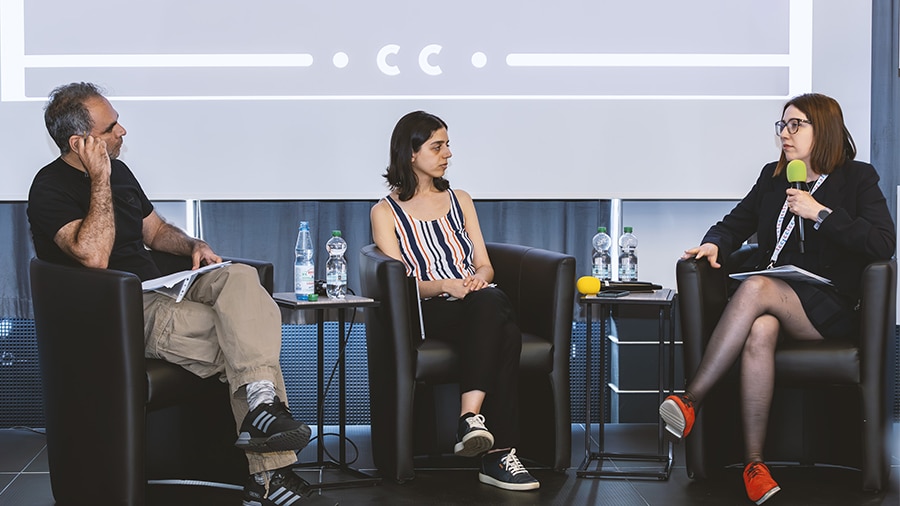This panel focuses on the discussion of queer Iranian identities in migration, and the relatives narratives and power dynamics involved in these matters.
Zeynab Peyghambarzadeh
The Construction of Narratives of Sexual Orientation in Persian-Speaking Communities in the Context of Seeking Asylum in Turkey
Mehran Rezaei
Power-Knowledge And Phenomenal Self; Examining A Non-Foucauldian Approach In Studying Iranian Queer Identities In Exile
Moderator: Anahita Hosseini
Abstracts
Zeynab Peyghambarzadeh
The Construction of Narratives of Sexual Orientation in Persian-Speaking Communities in the Context of Seeking Asylum in Turkey
In recent years, a diverse range of resources about Iranian gay, lesbian and trans individuals, both in Persian and English, in academic and non-academic content, has been published. However, the dominant mono-normative narratives of sexual orientation in these resources reduce the diverse spectrum of sexual orientations to the dichotomy of heterosexuality versus homosexuality.
In addition to that, since asylum processes have played a central role in shaping the Persian speaking LGBTQ communities in in post-revolutionary Iran, I will argue that the dominant mono-normative asylum narratives can shape not only the way that Iranian asylum seekers but also all Persian speakers in general tell their sexual stories.
Various studies argue that bi asylum seekers’ claims are by far fewer than lesbian and gay ones because other asylum seekers, as well as activists and lawyers, may encourage bi asylum seekers to perform gayness in the asylum process to increase their chances of being recognised as refugees.
With an interactive narrative analytical approach based on semi-structured interviews with Iranian asylum seekers and activists in Turkey, as well as an analysis of Persian social media debates, I will explain how a homonormative argument had been used to justify homosexuality at the expense of stigmatising bisexuality in advocating for acceptance of homosexuality in the three contexts of Global North countries and Iran, as well as in the asylum processes.
First, in reviewing the history of same sex sexual conduct in Iran, I discussed how the idea of (in)authenticity of sexual orientation became central in Persian-speaking communities inspired by the dominant narrative of gayness in the Global North countries. I will refer to the example of American psychologists who were advocating for the de-pathologisation of homosexuality in the 1960s to justify homosexuality as an immutable characteristic by distinguishing what was considered true homosexuality from pseudo-homosexuality.
By analysing the debate on Persian Twitter and my data about the pre-asylum life of Iranian SOGI-based asylum seekers, I will show how Iranian gay and lesbian individuals try to be the gatekeepers of the community and protect it from the non-monosexual individuals by focusing on the desire for a monogamous romantic long-term relationship that does not threaten the nuclear family’s accepted societal norms.
In the same way, by reviewing the literature on sexual orientation-based asylum and analysing my data on the asylum process in Turkey, I will argue that in the asylum process, some asylum seekers, activists and aid providers also apply the same logic to defend the true and deserving gay applicants. I will argue that what is common in all these three homonormative arguments is morally questioning non-monosexual individuals to legitimise homosexuality as immutable and consequently deservable.
This study contributes to various under-researched areas as not only one of the first empirical studies about bi asylum seekers but also one of the first empirical studies about bi individuals in the Global South countries.
Mehran Rezaei Power-Knowledge And Phenomenal Self; Examining A Non-Foucauldian Approach In Studying Iranian Queer Identities In Exile
Studying the social and political context of Iran, we have long been influenced by Michel Foucault’s insights into power-knowledge relations. His framework has provided analytical tools which were productive and thoughtful. However, at times, it falls short in developing a comprehensive theory to grasp certain nuances.
These nuances compel scholars to reconstruct and selectively apply his theory rather than questioning the main assumption inherent in his theoretical framework. In this presentation, I examine one such application concerning power-knowledge relations and the concept of self as developed in Afsaneh Najmabadi’s research on Iranian queerness in Iran.
I will elucidate how these applications encounter counterexamples due to the peculiarity of the context. Furthermore, I will propose a revision of Foucault’s theory of self and power, supported by examples drawn from empirical research conducted between 2022 and 2024 on Iranian queer migrants residing in Turkey, the UK, and Canada.
Rather than adopting Foucault’s conception of a deeply introspective self rooted in a panopticon-like power-knowledge dynamic, I illustrate how Iranian queer participants employ a strategic self in a context where the apparatus of power-knowledge lacks confessional elements. Here, power focuses more on conduct and public image rather than the inner secrets of individuals.
This shift in focus portrayed a porous system of power-knowledge in Iran in which subjects can exercise their stealthy freedom in surface-level and phenomenal spaces. However, the deeper layers of intentionality remain largely untouched by a panopticon gaze.


